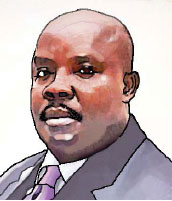Ordinarily, President Muhammadu Buhari’s admonition on the indissolubility and non-negotiability of the country’s unity should be the battle cry for every citizen in the face of challenges currently confronting the nation.
Nigeria, no doubt, is passing through a great deal of upheavals. Were we to be in an airplane, it would be apt to say that the country was passing through turbulence.
Aside the harsh economic climate that is hardly abating, the menace of corruption still looms large. Though the President’s anti-corruption crusade appears to be registering some successes, at least, going by claims by the Economic and Financial Crimes Commission (EFCC), the revelations on the efforts indicate that much still needs to be done to get the country out of the wood.
As if that is not enough, there is the angle of insecurity arising from Boko Haram insurgents and other common criminals holding the country to ransom. This is in addition to the challenge of collapsed infrastructure requiring urgent attention in virtually all parts of the country.
In situations as these, leaders understandably find themselves in a fix. But they do not give up. Rather, they adopt cocktail of strategies to keep their fellow countrymen going. One of such efforts is moral suasion. It was on this ground that the late American President, John Fitzgerald Kennedy, urged the Americans to “ask not what your country can do for you, ask what you can do for your country”.
Generations of Americans after Kennedy still hold on to this philosophy. It is also on this basis that an average Israeli or German would see it as an honour to die for the service of his fatherland.
If Buhari had spoken along this encouraging line, given the huge stress Nigeria under him has been weathering, he would have achieved very high points.
To be fair to the President, he had made this resort to emotions in his first coming as Military Head of State. Then, as a young man, Buhari had reminded Nigerians that they had no other country except Nigeria and should join hands to salvage it. More than the guns and the bayonets, that simple invitation to the people turned out what he needed most in rallying support, especially from the youths and the downtrodden, in the 20 months that the regime lasted.
But this time around, when age and experience are expected to have sobered him, the President is curiously choosing to spit fire. When, for instance, he spoke to his Sallah guests last Wednesday that the nation’s unity is not negotiable, the President was actually issuing a veiled warning without overtly appearing so.
Targets of his declarations were Niger Delta activists, suspected to be vandalising oil pipelines in the region, and members of the Indigenous Peoples of Biafra (IPOB) and Movement for the Actualisation of the Sovereign State of Biafra (MASSOB).
IPOB/MASSOB agitators are seeking independence for a state of Biafra from the Nigerian federation, while Niger Delta activists, apart from demanding restructuring of Nigeria, are also asking for greater say in the management of the oil resources in their region.
Buhari has not hidden his disdain for these groups and their agenda. When therefore he asked that the boys be told that to keep Nigeria one is a task that must be accomplished, he was actually drawing the battle line.
He even went further to draw an unsettling analogy with the situation in the 1967 to 1970 Civil War when the mantra on the Federal side was “Go On With One Nigeria (GOWON)” – a euphemism to frustrate the Biafra self-determination agenda, at all costs.
Two things readily come to mind any time this slogan resonates. The Nigerian Head of State then was General Yakubu Gowon. By an odious coincidence, the acronym tallies with the spelling of his surname. That also was the vicious battle cry the federal forces employed in visiting the armless Biafrans with attacks that could pass for the most atrocious military campaigns in modern history.
For the President therefore to reference this slogan, in whatever manner and for whatever reasons in calling his fellow citizens to order shows the direction of his mindset in dealing with some sections of the country.
Perhaps, Buhari needs to be reminded that times and templates of leadership have changed between 1967 and 1970 he was referring to, as well as between 1984 and 1985 that he called the shots as military ruler. The world, as he saw it then, is no longer what it is. In contemporary international relations, there are no longer iron-cast boundaries.
Unity at national and supra-national levels is no more a matter of force. It is rather consensual. In the entertainment world, the maxim is that if the Titanic could sink, any other ship can go under.
In that case, anything is possible. And there are instances. Until the early 1990s, the Union of Soviet Socialist Republic (USSR) was almost a behemoth in the then Eastern bloc. Faced with enormous threats from the rival Western bloc led by America, the Soviet Union relied much on its huge population and military strength to assert its authority in international politics.
But with the adoption of the principles of glasnost and perestroika, by the leadership of the Union, it became obvious that the constituting Republics needed to go their separate ways. They have not been faring badly, ever since.
It was in similar tone of exercise of freedom that saw the former Czechoslovakia splitting into Czechs and Slovaks.
United Kingdom (UK) also allowed the people’s will to prevail recently when, in a referendum, those in support of Scotland remaining part of the Union had their way. Just last month, Britons who did not favour their country remaining in European Union (EU) had upper hand in a referendum. Britain, which tolerated the exercise, was, incidentally, our colonial master.
The outcome in any of the instances above was arrived at through dialogue and not intimidation in whatever form. If Buhari is therefore genuinely interested in the indissolubility of the Nigerian nation as currently constituted, he can do so without any subtle or overt threat.
He only needs to exhibit transparent and inclusive leadership as a first step in enhancing the country’s unity. He also has to broaden his outlook and change the trend of his activities in relating with other constituting units of the country outside his Northern region of birth. With these, he can preach to Nigerians the gains of a wholesome entity.
Sadly, his actions and appointments so far do not portray him as being interested in Nigeria’s unity. His increasing provincial disposition on issues of national interest rather advertises him, perhaps unintentionally, as even working seriously against the country’s unity. And that is the real danger.

- Advertisement -
- Advertisement -
Must Read
In Nigeria, judicial appointments have become network corruption
In Nigeria, judicial appointments have become network corruption
By Chidi Anselm Odinkalu
“Fools at the top...










